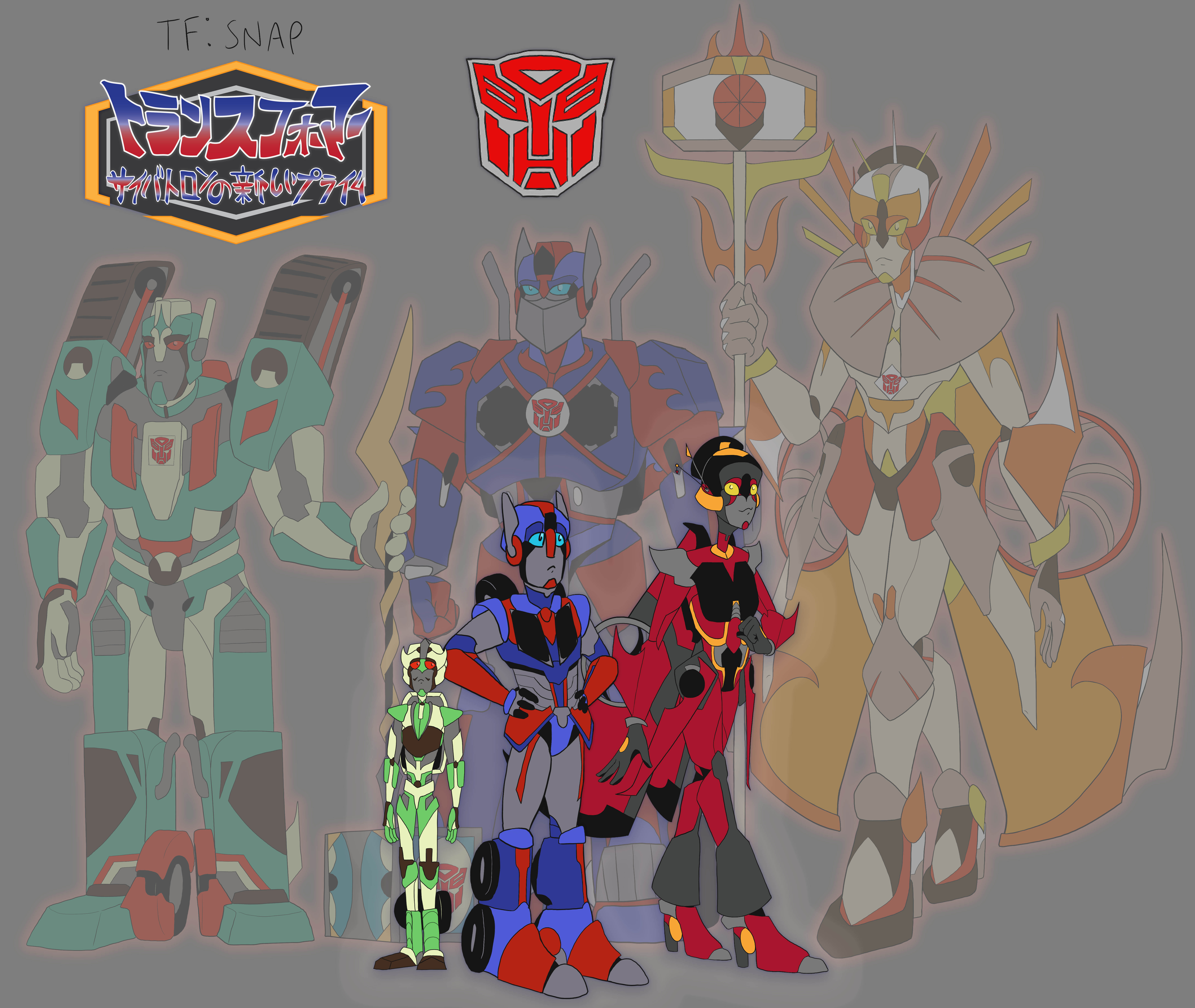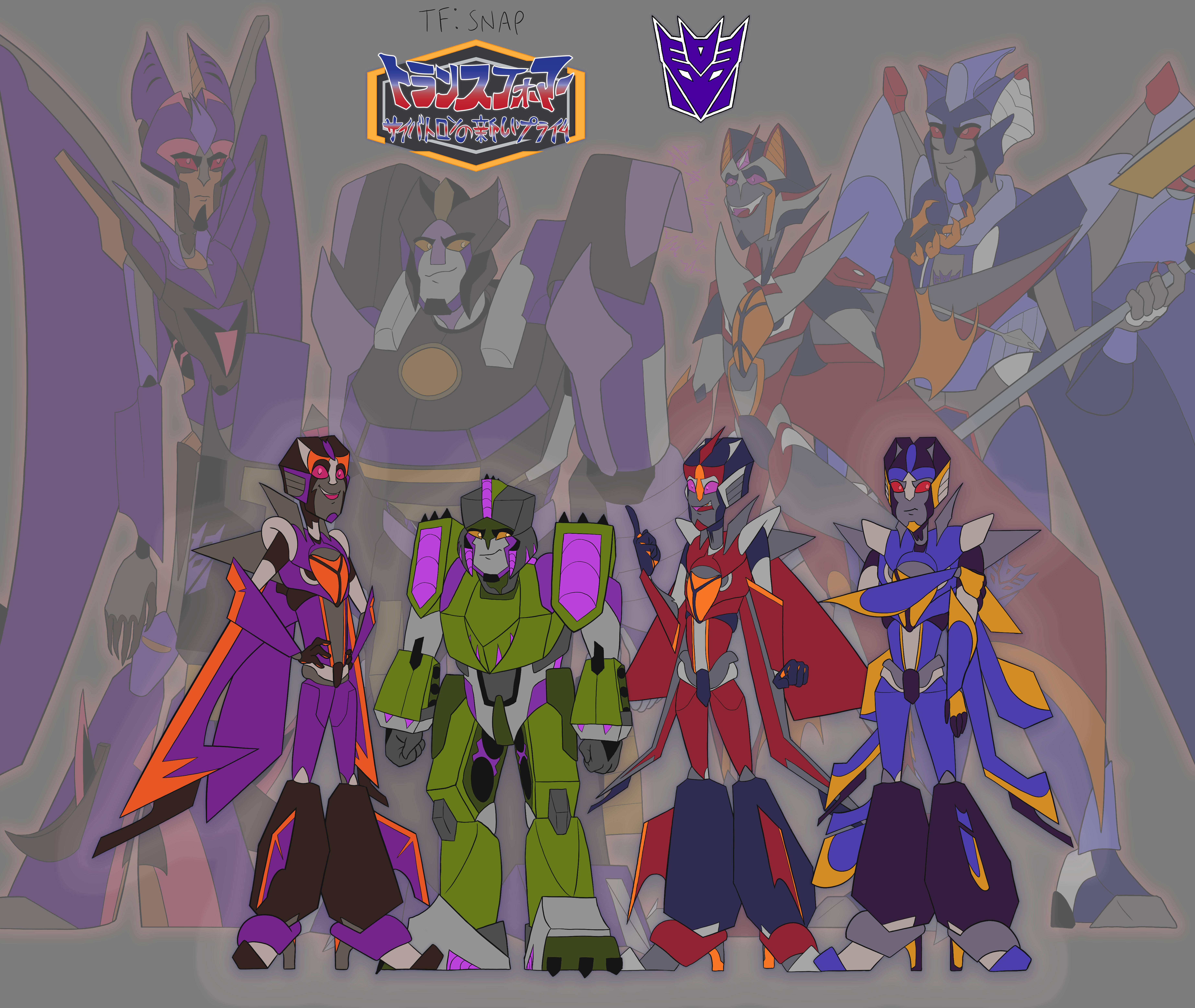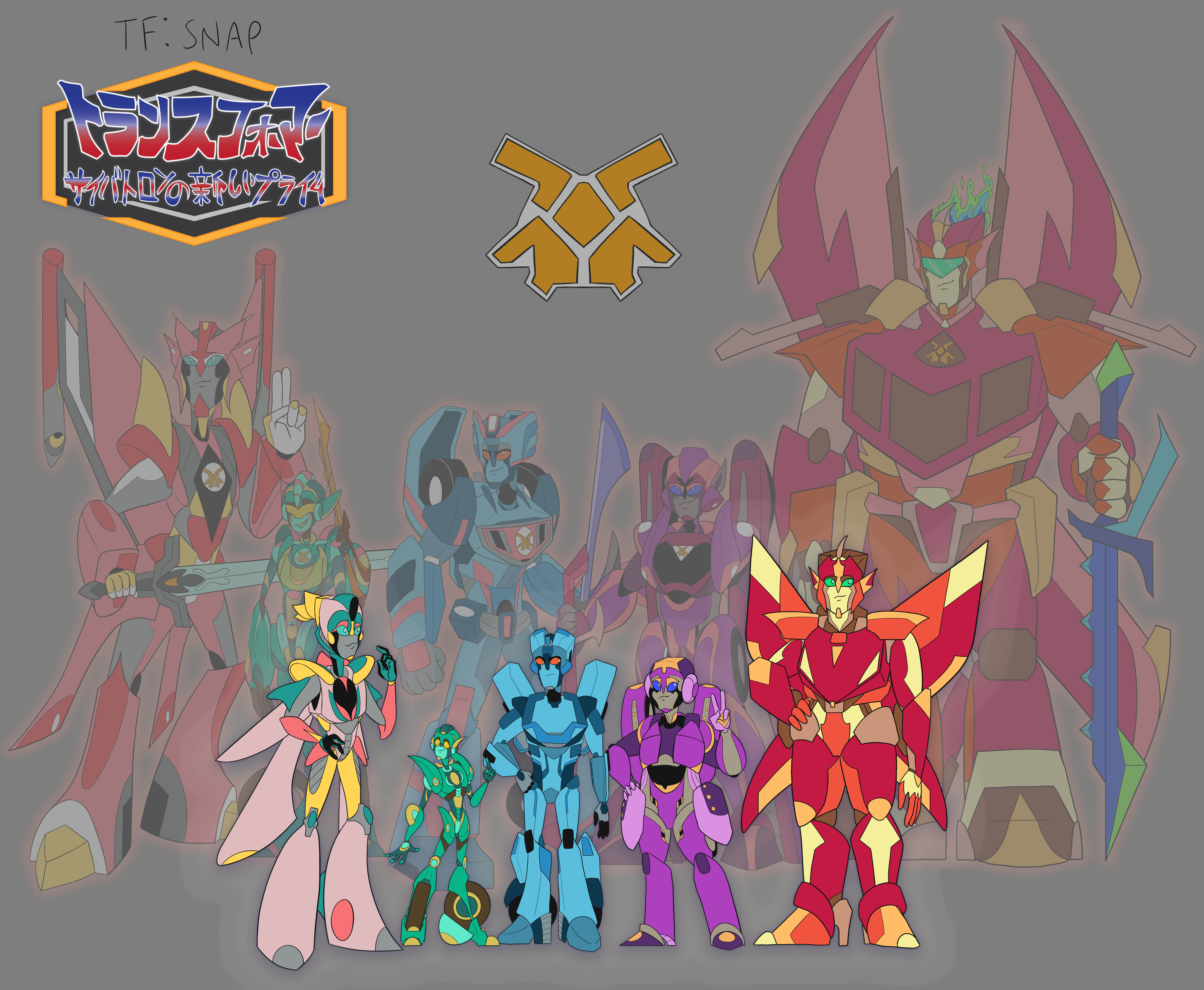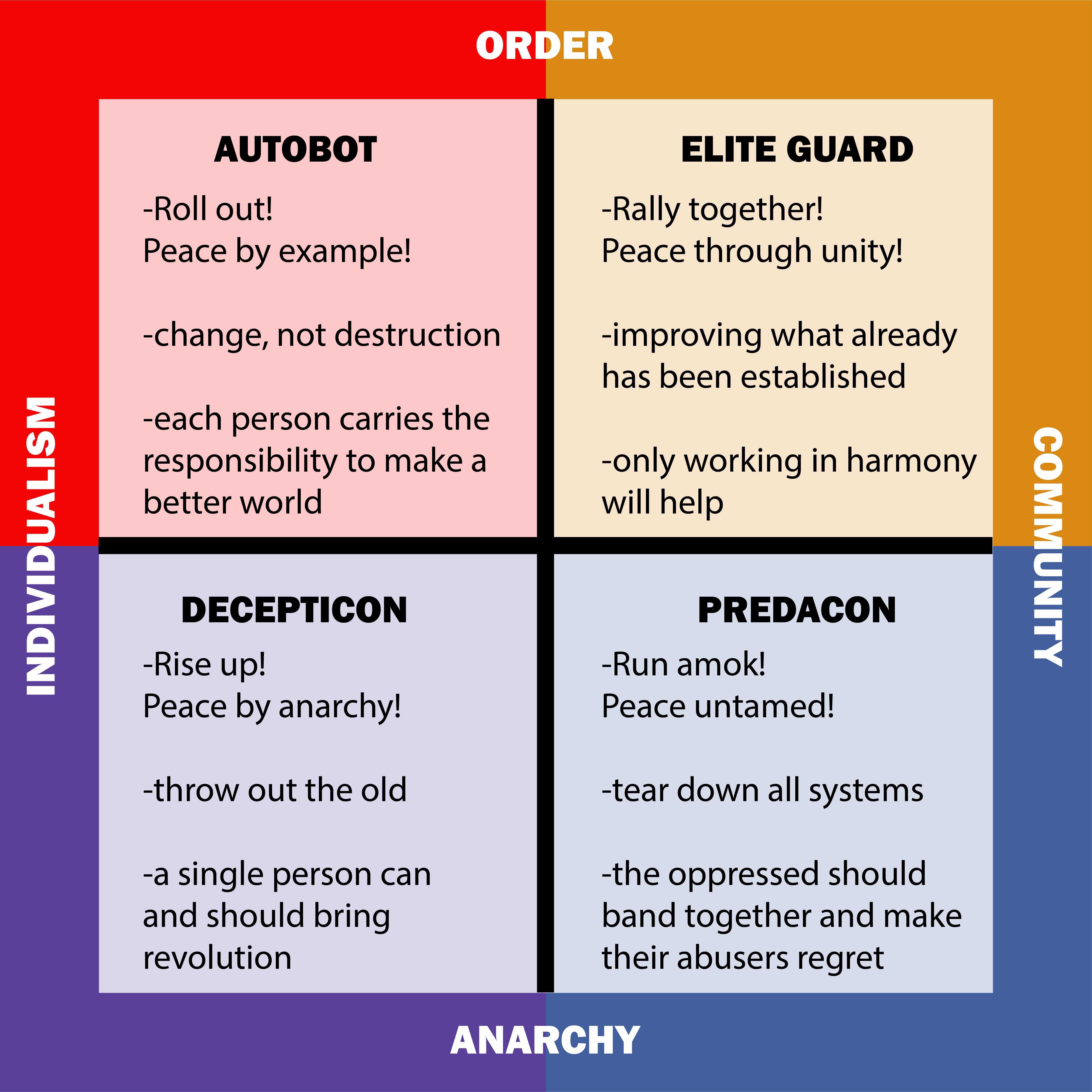JHIAXIAN ACADEMY OF ADVANCED TECHNOLOGY
Some call them gods. Some call them criminals. Some call them chaos incarnate. Most call them a menace to Iacon and a threat to public sanity. Though their numbers may be small, the four vigilante factions are more than capable of changing the world, if they ever stop squabbling with one another. Huge, superpowered, and possessed of radical convictions, these so-called heroes appeared out of nowhere to protect the city from paranormal threats and try to inspire revolution against the injustices of functionism. Their political goals may be more convincing if they weren't causing just as many problems as they claim to solve. After awhile, their magical antics are more irritating than awe-inspiring. Given the relics they weild, their claim to the legacies of the ancients, some have taken to calling them The New Primes Of Cybertron.
What the general public doesn't know, however, is that these uncoordinated, overdramatic vigilantes are all secretly younglings. They're taking time off from homework to power up and save the world before rushing back to class, hoping nobody noticed their absence. What the rest of the world sees as street gangs engaged in a turf war is actually the unsupervised rowdiness of children given anonymity, superpowers, and a lot of opportunities to mess up. Even in their immaturity, they're making enough of an impact to earn the ire of a shadowy monster trying to eliminate them once and for all.
Origins
Autobots & Decepticons
With the opening of the Jhiaxian Academy of Advanced Technology, the seven younglings who would form the original two factions were drawn together as students. Orion Pax, Minimus Ambus, and Windblade meet at the first school assembly as new roommates. Megatron, Starscream, Skywarp, and Thundercracker had all known each other previously and reunite on campus as dorm neighbors. Despite getting their relics at approximately the same time and resolving to protect their school and city, the two groups had wildly different origins. The Autobots were given their relics in the middle of a crisis by the Academy's librarian Alpha Trion after making a good impression on him, with explicit instructions on the nature of the supernatural calamity. The Decepticons barely survived a collapsing building, discovered mysterious objects of power thanks to the interference of a secret onlooker, and proceed to stumble their way into protecting people through passion and panic alone. [s1e01]
Ostensibly, the Autobots are at an advantage, knowing where their relics came from and why they received them. But Alpha Trion is a notorious drunk, antisocial recluse, and infuriatingly obtuse academic, and he seems to deliberately worsen whenever they try to ask him questions about who he is or what's going on. It doesn't take them long to strike out on their own. As the Decepticon ranks swell and the Elite Guard appears, they start feeling the pressure of being only three people, even after the Torchbearers are created. [s1e07] Orion, Minimus, and Windblade collectively decide to accept Hot Rod as another member when he shows promise after assisting them in a crisis and share their civilian identities with him. [s2e11] After doing some investigation into the factions on his own, Blurr discovers a relic and jumps in to help without sharing his identity, a fact which the others are leery about but accept nonetheless. [s3e07]

The Decepticons have no context for their relics or what they should do with them, but that leaves them free to blaze their own trails. They get to define their own purpose and accept people's allegiances on their own terms. It's thrilling, but it can lead to some rather stupid shenanigans, like Scourge's creation of the Sweeps. [s1e06] That radical energy motivated Makeshift to work with the faction, [s1e09] but it also ended up driving them away after some secrets came to light. [s2e15] Attracted by the power and individualism of the Decepticons, Nightracer seizes an opportunity to join them in their open rebellion, a move which the original four did not expect but accepted regardless. [s1e12] Blitzwing too felt called to the faction after Galvatron's impassioned defense of triple-changers. [s2e08] Originally, Deadlock's surly, defensive tendencies made the Decepticons look like the perfect opportunity to lash out at society like he wanted to, [s2e11] but his experiences as a vigilante start a change in him. It takes awhile, but he finds he may fit better with the Autobots after all. [s4e04]

Elite Guard
Before attending the JAAT, the Elite Guardsmecha were all complete strangers. Only Arcee lives on Cybertron. Chromia and Firestar are Camien, Moonracer is Velocitronian, and Ariel is Carcerian. The five of them are roommates and quickly struck up a friendship within the first schoolvorn. When Ariel finds a strange object in a cafeteria supply cart, she brings it back to show to her roommates, which lets them all bond to it at the same time. As an already established tight-knit group, none of them felt any desire to join the Autobots or Decepticons. The former may be more agreeable, but they miss a certain aspect of community that the five of them prefer to emphasize. They're the best and they know it, and while they'll cooperate with others, they don't need anyone else to join them.

Ironically, their improved communication doesn't help them discover one of their greatest collective powers until a few vorns in. Their relic can turn people into combiner teams by merging them into a gestalt form, but it turns out the Elite Guardsmecha themselves have also been a combiner this whole time! It's dangerous, and thrilling, and no other faction can compete when Elita Infin1te appears on the battlefield. [s4e09]
Predacons
Makeshift began as a Decepticon, but that faction didn't focus on the issues they felt drawn to. Their defection led to a lot of introspection and lone wandering. They knew they didn't want to go it alone, but they weren't sure who would work with them. After a specific encounter with Predaking and Blackarachnia, they knew these two shared their values and might just make good teammates. [s3e05] The three of them are much more deliberate than the other factions, approaching this not as a fun jaunt around town or an opportunity to pick a fight but rather as life-saving activism. It sets them apart from the rest in a palpable manner.

In sharp contrast to the rest of the faction, Soundwave is neither deliberate nor possessed of any particular convictions. Rumble and Frenzy barely manage to function together on a good day. They joined the Predacons more as an easy way to get backup when needed [s4e01] and eventually get to the point where they'll follow Abominus's leadership... sort of. It also doesn't take them long to decide they need faction members to boss around themselves. Six siblings from the Tripredacus Den accept an offer to become a minicon: Ravage, Howlback, Lazerbeak, Buzzsaw, Squawktalk, and Beastbox. [s4e04] Together they make something of a faction within a faction, somehow exemplifying Predacon philosophy in a much more chaotic way.
Ideology
Despite what some people think, each faction has a general philosophy, a purpose behind their chaos. They're also distinct groups willing to cooperate with one another rather than one mass of chaotic anarchists or warring gangs claiming territory. No faction is synonymous with another. Each group exists because their members witness injustice in society, as well as the magical disasters that keep happening, and they all want to mitigate or prevent that. Repeated threats against the JAAT or Iacon in general give them opportunities to act on their ideologies to better Cybertron in the way they see fit. They go about it in different ways, which is a source of friction between both each other and the people they're ostensibly trying to help. Pity that their youngling immaturity and brand new superpowers means many disagreements end up escalating to violence.
- the Autobots are very independent and optimistic, wanting to inspire improvement in society through their own actions. More often than not, they want to cooperate with existing systems in the hopes that they can make them better without destroying anything.
- the Decepticons have a similar emphasis on a person’s responsibility, only to the opposite end, to get rid of the regime and start over. Galvatron in particular identifies as an anarchist, and the faction's general spite for the establishment fits that label.
- the Elite Guard is a team of people from many different colonies and upbringings, so they have a fairly well rounded perspective on what different governments and societies can look like, they just want to make sure everyone is considered and provided for within the current system.
- the Predacons have no love lost for any of it, and a lot of rage at the mistreatment of those considered lesser, but they understand the necessity of safety in numbers and a united front against those in power.

If the general public knew just who these strangers were before the relics, things might make more sense with how their backgrounds have shaped their philosophies:
- Megatron is actually from a fairly well-to-do family. His sense of social justice is still biased and heavily based on his own experience of what a single person in power can do, instead of the comparatively little that even a group of low-class mecha can accomplish. He’s grown up with the benefits of the system on his side, and it’ll take awhile for him to expand his view and realize that.
- Predaking, on the other hand, has been a beastformer all his life, and is well acquainted with the sort of flak that functionism will throw at his frametype. He’s experienced the prejudice and injustice firsthand, and has a lot of pent up righteous anger. Beastformers, toolformers, junkers, he’s not going to let any of them get left behind, not when all of them are oppressed.
- Ariel is from Carcer, where private property is optional, communities are closely knit, and even children are raised by the whole town. She’s got an outsider view of the injustice on Cybertron, but she has no particular ire towards it. All she wants is the ability to be herself, no matter where she is, and the same for everyone else.
- Orion, meanwhile, has something of a complex. Of all the heroes, only Orion, Minimus, and Windblade were specifically chosen by Alpha Trion, guardian of the relics. They’re the only ones with some semblance of understanding that these things are quite literally tools of gods long past. Orion has taken this the hardest. He holds himself to the highest standards. After all, he’s filling the role of ancient heroes still worshipped today, living up to the legacy of the ghosts still haunting the relic he bears. Could he allow himself to be anything less than individual, actualized, and perfect?
Ultimately, every faction has a solid point to make. The world is complex, and they're learning, and no problem has an easy, universal answer. They are passionate young progressives infighting about their preferred activism, enabled by the mask of secret identities and dramatic public response. It will take more than a few squabbling vigilantes to change the world, but millions upon millions of mecha have seen them at work, watched the news, or read commentaries on their actions. Maybe they'll end up sparking a revolution despite it all.
Public Response
Thanks to their supernatural nature and less than professional behavior, public opinions about the factions vary wildly. They're medical anomalies, they're threats, they're saviors, they're horrifyingly powerful wildcards that you can only pray will choose to be benevolent today. Ask ten individuals their opinion, hear eleven answers. Some folks are massive fans, some would like to see them publicly executed, some started making merch in their image for a quick profit, some couldn't care less as long as they can get to work on time. Citizens of Iacon especially are most likely to grow tired of dealing with them, but at the same time are most likely to owe their lives to vigilantism.
Love them or hate them, the factions generally do not shy away from declaring their purpose. With the degree of attention they receive, their political views are not only well known but actively spoken about across multiple planets.
JAAT
The Academy owes its continued existence to the intervention of the factions when it first opened. The staff and students are the ones who refer to them as heroes most often. Principal Shockwave has a fairly good working relationship with them when they deign to slow down and speak to regular authority figures, especially the Autobots. Although the JAAT has come under harsh scrutiny for its mostly positive reaction to them, it's very difficult to cast them in a poor light when repeated disasters nearly topple the school only to be narrowly averted by the factions.
Many students treat their local vigilante groups like favorite sports teams or particularly entertaining wildlife. "Hero-spotting" is something of a hobby for many of them, and some like Tailgate actively endanger themselves for another glimpse. Faction members are often the subject of frag/endura/kill conversations, handcrafted merch, or celebrity crushes. The frequency with which students find themselves at ground zero of the latest disaster means their social media content is often the most immediate and accurate source of information about them.
Stratocracy
Compared to the deeply unserious attitude Iacon's younglings have towards them, the factions are treated as criminally insane, barbaric degenerates, and world-ending threats to civilization itself. The Cybertronian Senate spends weeks squabbling amongst themselves on how exactly to eliminate this unnatural plague upon their capitol every time they meet. The High Council plots new ways to trap them, ban them, discredit them, destroy them, with the Grand Architect himself weighing in on the issue. Scores of Enforcers are put on duty specifically to find and neutralize them by any means necessary.
This violent reaction to vigilantism is expected. After all, any dissent against the Stratocracy is a challenge that must be put down. But the dramatic political response is, in a way, validating the factions' efforts and platforming their ideologies. They have demonstrated to the regime and the public as a whole that some resistance is effective, and despite all efforts they still remain free. If it weren't for their ability to power down and disappear into the civilian population, they'd almost certainly be found and executed by now.
The politicians running Cybertron need little encouragement to retaliate against a threat to the power structure, which makes for a convenient distraction. Some forces make more deliberate moves against the factions in a way they wouldn't want brought to public attention, especially when that would involve revealing a few secrets about what keeps causing these supernatural disasters in the first place.
Media
The news cycle is having a field day with the factions! Their controversial ideals, their criminal violence, their magic powers, everything about them is gold for reporters. Rewind in particular throws himself into the fray to get another stunning action shot on the regular and has become one of the most prolific commentators. Platforming the individual vigilantes can be dangerous, however, as often they'll launch into an anti-functionist spiel that has to be censored. Portraying their illegal activism too positively may earn political backlash, but refusing to air their activities entirely is a surefire way to lose their audience.
The Autobots especially have a complex relationship with media attention, as they're the faction trying to inspire change by example. Some have exploited this to manipulate or blackmail them. Their public reputation keeps wavering between 'the only half-decent ones' and 'destructive evildoers' depending on how they handled the latest drama. Optimus does his best to uplift everyone with a kind and noble air that tugs on sparkstrings even through a camera. The Mistress usually has something encouraging to share whenever a reporter flags her down, or can give a quick and eerily accurate announcement on what parts of the city have been damaged. Most news crews have learned to avoid Ultra Magnus, because he'll launch into an encyclopedic list of every instance of malpractice, abuse, illegality, and disrespect in recent Enforcer behavior, which isn't the kind of propaganda they're supposed to be platforming. Rodimus is a chaotic force who has been known to snatch up cameras to take a selfie, Drift either ignores reporters or sends them away with some lofty spiritual advice, and Cheetor may be going too fast to show up in footage at all.
The Decepticons are villainized more than any other faction and they love it. Well, at least Galvatron, Hellscream, and Thunderblast do. Galvatron takes advantage of every opportunity to pontificate on the evils of society and the right to rise up for freedom. Much like Ultra Magnus, broadcasters have learned to cut the feed as soon as he starts speaking so his ideas don’t get the chance to spread too far. Hellscream cares less about principles and more about scaring the living daylights out of every reporter he sees, often leaving them with cracked equipment and ringing audials from the sheer destructive power of his voice. Thunderblast just wants to preen in all the attention and she certainly gets it. Cyclonus actively avoids most gawkers, Scourge talks too long and complicated to make good news, and Triptych is dangerously unpredictable so most news crews have learned to stay away from him.
Thanks to their debut and early cooperation with the Autobots, the Elite Guard are usually portrayed as a backup team rather than a distinct faction of their own. Every time Elita 1 is asked what it's like to be Optimus's sidekick, her attitude towards her fellow vigilante sours even further. Elita 2 is startlingly good at winding the reporters around her little finger and always seems to know just what to say, whereas Elita 3 just grumbles at the cameras, even sometimes demanding they respect boundaries or be locked in the nearest building with the use of her powers. Elita 4 barely notices them unless she’s in the mood to prank someone, and Elita 5 just avoids them, as they tend to dramatize her size and thus her danger. Given their excellent teamwork and how they’re (mostly) in favor of reform instead of anarchy, the Elite Guard would actually have a good shot at getting along with the news. Unfortunately, they're too uncompromising and independent to cooperate with condescending authority figures, including the people wanting to interview them, so instead they come across as a standoffish and self-serving clique with dangerous habits.
The Predacons came into existence in a negative light, and they were grimly prepared for it. After all, Sixshot used to be a Decepticon, and their falling-out and defection caused quite a stir. When Abominus first appeared, the fearful reaction of the public to such an ‘abomination’ is actually how he chose his name in the first place. Airachnid loves tormenting reporters with nuclear-grade sarcasm and subtle threats, but if anyone makes her truly mad she’ll string them up in her web cabling and leave them hanging. She also flaunts that cabling by using her darts to knit nets, shawls, and other decorations. Enforcers use capture equipment designed to trigger entrapment protocols, so her mimicry of that as nothing more than a casual accessory is a pointed insult. Soundwave is a category of his own. Despite his relatively late appearance, the media soon learns to quake at the thought of encountering him, and his minicons are little better. There’s at least one instance where he Rosanna-rolls the entirety of Iacon.
Junkers
As social outcasts, most junkers are cut off from the news cycle and political scandal of faction activity. Their poverty and marginalization puts them at greater risk of injury or death in the event of a disaster, monster, or other upheaval endangering Iacon. The odd overlap of illegality and liminality that junkers and vigilantes share means they've developed something of a mutually silent relationship. Junkers don't hound faction members for attention, and the factions don't alert Enforcers to junker communities, or even actively protect them. The Decepticons spend a lot of time in the undercity and are on pretty good terms with the junkers that live in their general vicinity, like Terminus. In fact, Thunderblast seems to think of him as a pretty valuable ally for some reason, even entrusting him with part of their plots. The Autobots have found an effective way to get the school into lockdown to protect the students is to first go to Wreck-Gar, and he often has some interesting news off the street with which to warn them. Elita 2 realized she can quickly and easily prevent them from starving by finding energon for them, and will often make time to seek out a junker or two to dump a haul of stolen crystal in their arms, and the rest of the Elite Guard follow her lead.
However, none of the original three factions actually make it their mission to seek out and uplift junkers or regularly provide for their basic needs. Junkers aren’t really lacking for shelter in Iacon, since so much of the undergrid is dilapidated and unpopulated, but they have other needs that go unmet. Many of the vigilantes figure it’s sort of a losing battle, as the system is set up against them and a few criminals, however supernaturally powerful, cannot help everyone forever. So the junkers, as well as other institutionally oppressed groups, sort of slip through the cracks of their priorities. Even Nightracer falls into the trap of trying to elevate herself above her fellow junkers as Thunderblast to become “better” somehow. This oversight of a significant marginalized population is a major catalyst for the formation of the Predacons and a deliberate axis of their activism. The few of them can’t do much to change the overarching circumstances, ultimately, but they still make a point of helping. Sixshot carves out access tunnels and breaks barriers for junkers to navigate unseen. Airachnid actively hunts down Enforcers seeking their communities. Abominus brings fuel and other practical resources. They can’t truly provide for every single junker, but they purposefully do their part to shore up the community.